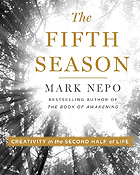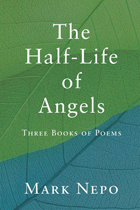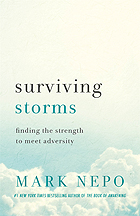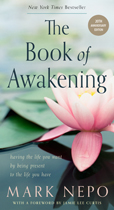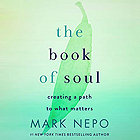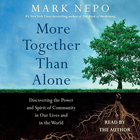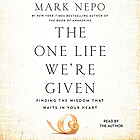| poetry |  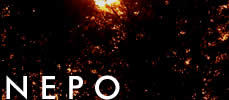  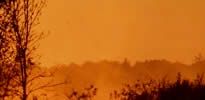 |
|
Fire Without Witness BRITISH AMERICAN PUBLISHING, LTD.,LATHAM, NY, APRIL 1988, OUT OF PRINT LIMITED AVAILABILITY THROUGH BIBLIOFIND AND AMAZON NOMINATED FOR THE LENORE MARSHALL PRIZE IN 1988 I derive great comfort from reading and re-reading Mark Nepo's poetry—the economy of your language, the precision of your imagery, and the way he has put himself into the mind of the great master, Michelangelo. It gives me calm since it makes a lot of things dwindle in significance if measured with the yardsticks of the three millennia that form the stuff of the epic.
BOOK DESCRIPTION Fire Without Witness is an epic poem that centers on the world of Michelangelo as revealed through his painting of The Sistine Ceiling. While painting the different panels, he reveals stories of his time, his life, and through his dreams, the future. As the panels are painted, the prophets and sibyls and objects of Creation come alive, unknown to Michelangelo, and tell their stories. The poem presents two skewed realities. And while at times the Biblical and Mythic voices see Michelangelo, they never reach his awareness. They barely interact, in brushing contacts we alone witness. The poem follows, in sequence, the way Michelangelo actually painted the frescos on the Ceiling. The order of painting here is what I see as most logical. Other suggested sequences exist, due to the uneven progression of his work, but it is clear he painted the story of Creation in reverse order, moving from Noah to Adam to God creating the elements, winding his way back to the beginning. It took him three years to paint the Ceiling, not including the border of lunettes, and the poem is broken into three parts or movements, 1509, 1510, and 1511, each part into sections representing the panels painted during those years—25 sections in all. It took me ten years to write the poem, which seems now a painting itself. It seems a vision of that rim between the human and the infinite, where our body of sense almost leaves us, than settles and hardens into what we are. And when dealing with the infinite, all comes down to one encompassing, unnamable source, one fire without witness. As Michelangelo himself put it, “What is in the very center is always free.”
EXCERPT Moses Has Trouble With God's Instructions Moses wants to return to the living, then recalls, after retrieving the Tablets the second time, his trouble with God’s instructions how to make the candlestick holy. MOSES: It seems odd: the things I remember most There are only two conclusions:
REVIEWS “A daring, myth-making poem with unforgettable moments.” “The whole of this giant poem is a perfectly amazing dream realized,
and I do congratulate the poet with all my heart. I am startled by his
ability to annihilate time—this is both timeless, and right now.
The great scope never minimized the individual, vivid episodes. This poem
is going to steadily gather recognition.” “Fire Without Witness is remarkable
in its ambition and conception and cumulative weight. I can recognize the
depth of experience and breadth of vision at work, or at play, in the poem;
and can share the author’s wonder at the verve and intricacy of what
came his way. There are uncanny moments throughout—as when the Moon
or the Brazen Serpent speak, or Michelangelo opens his throttle to the
fullest.” “This long poem must be a delight and confirmation for members of
Euro-American culture who are thirsty for contacts with their own key stories
and mythologies. The dramatic and original re-tellings in these poetic
episodes are both workmanlike and inspired—see the Dream of Eve,
or David and Bethsheba. And much of it comes up from the bedrock of mind
and myth. I am moved and challenged by this mighty project.” “An imaginative tour de force in which Nepo has created a universe of the mind. “One of the most ambitious and finely wrought poetry works of our age.” “The work is startling because the figures are so alive that they actually create themselves.” “Mark Nepo’s Fire Without Witness puts
us in the presence of genius—the creative spirit embodying itself
in our world through one profoundly gifted and dedicated human being.” |



|
